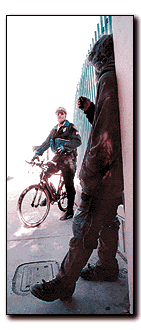![]()
![[ NEWS ]](/images/fall97/newsf97.gif)
![]()
By Alicia A. Caldwell
Arizona Daily Wildcat December 10, 1997
Warmer Winters in Tucson
![[Picture]](01_2_i.gif)
Charles C. Labenz James Hull sits on a city bench on Fourth Avenue yesterday while his friend Pat Hogen plays with his dog Tyron. Hull plans on going back to Washington where he can live in the forest and fish. |
As days grow shorter and evening temperatures drop, at least one thing is
on the rise in Tucson - homelessness.
The homeless population in Tucson, indeed throughout Arizona, increases each year during the coldest months, according to Chief Harry Hueston of the University of Arizona Police Department.
The average person would rather brave chilly Arizona streets than suffer sub-zero temperatures elsewhere, he said.
Self-described "traveller" Jeremey Comer concurred with Hueston's assessment.
"God called me here and it's warm," said the Florida native who was passing through Tucson last week.
"I'm not homeless, I always have a place to stay," Comer said. "I just sleep in the woods."
Hueston compared the homeless population to that of the annual snowbird influx saying there is a natural increase in the number of transients each year and no way to tell how big the increase will be.
A new Tucson City Council ordinance that bans loitering in various areas around Tucson, including the university area, may have had an effect, according to a local business owner.
George Goldman, who owns the Arizona Bagel and Deli at East University Boulevard and North Park Avenue, said the homeless hadn't been a problem this fall.
"I haven't had a problem (with panhandlers)," Goldman said, adding his restaurant's no loitering policy has not been an issue thus far this year.
Alex Bouzari, owner of Delissimo Deli around the corner from Arizona Bagel, said he believes the homeless population has migrated toward the University Boulevard area because police are enforcing loitering laws on Fourth Avenue.
"I think most students also try to help," Bouzari said. "Maybe it's because Fourth Avenue is more strict now."
UAPD Cmdr. Brian Seastone said city loitering codes will not be enforced on campus.
"That (the loitering law) is a city code, we only enforce state codes," Seastone said.
Goldman said he has tried to help area homeless by leaving excess food outside his store for anyone who wanted it. However he changed that policy after several neighboring merchants complained about the practice.
"It (the food) seemed to be a magnet for increasing the number of people who would some times become aggressive in their panhandling," Goodman said, adding he now donates the excess to a local food bank.

Charles C. Labenz James Hull discusses law procedures with Sergeant Pete O'Crotty of Tucson Police Department Bike Patrol. Hull was recently cited for possessing a pocket knife in a city park and was curious about the statute prohibiting weapons in the park. |
Bouzari said if he has any left over food he will give it to homeless people who ask. He said he thinks that it is a misdemeanor to give food to panhandlers, but he will give the food away rather than waste it and let someone go hungry.
"Some of these kids are really young, it's really harsh to see," Bouzari said. "A 13- or 14-year-old is helpless."
Even so, these children are out there.
Lucky Gibson, 19, was hanging out with 18-year-old Megan Hoover last week. Both were ostensibly "traveling."
"The first day I got in town there was a kid getting arrested for just sitting on the sidewalk," said Gibson, who grew up in Georgia.
Gibson, who said he has been on the road for 2 1/2 years, added he feels paranoid every time he sees a police officer for fear of being arrested.
Both he and Hoover, originally of Connecticut, plan to hitchhike to Phoenix sometime soon.
Comer, Gibson, Hoover and others might want to check out a website created by pre-education senior Mike Davidson, who was homeless for six months last year.
He said the site, at http://members.tripod.com/~bmdavidson/index.html, has links and directions to shelters and soup kitchens. Homeless people can access the Internet at a local library.



